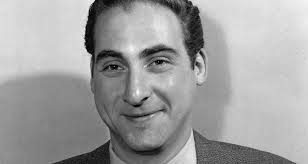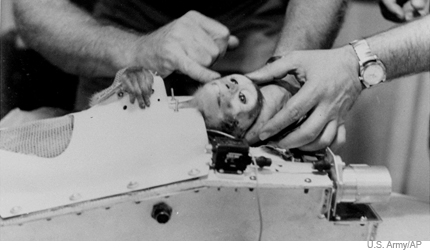
Television pioneer Sid Caesar, 1922–2014. “Albert Einstein was a Caesar fan. Alfred Hitchcock called Mr. Caesar the funniest performer since Charlie Chaplin.”
Haunting the Web Since 1999

Television pioneer Sid Caesar, 1922–2014. “Albert Einstein was a Caesar fan. Alfred Hitchcock called Mr. Caesar the funniest performer since Charlie Chaplin.”
“Nonfiction writers who succumb to the temptations of phantom scholarship are a burgeoning breed these days, although most stop short of fabricating interviews with Presidents. But Stephen Ambrose, who, at the time of his death, in 2002, was America’s most famous and popular historian, appears to have done just that.“
In less-sanguine history news, and by way of Past Punditry, a new blog by an old Columbia colleague of mine, it appears that the late Stephen Ambrose — already unmasked as a serial plagiarist — also conjured several purported interviews with President Eisenhower out of thin air. “Access to Eisenhower in his retirement years was tightly controlled…These records show that Eisenhower saw Ambrose only three times, for a total of less than five hours. The two men were never alone together.” Hmm…I could’ve saved a lot of time in gradual school if I could just make it up. (Sadly, there’s been a rash of fake presidential quotes going around lately.)
“In the summer of 1959, Allen Ginsberg, the generation’s visionary poet of exuberance and doom, wrote in the Village Voice: ‘No one in America can know what will happen. No one is in real control. America is having a nervous breakdown…Therefore there has been great exaltation, despair, prophecy, strain, suicide, secrecy, and public gaiety among the poets of the city.’ He might as well have written that today.“
In Slate and per his recent book, Fred Kaplan makes the case for 1959 as a Very Important Year, and uses the groundbreaking flight of Luna 1 as that moment’s muse. “[I]t, and the race to space that it triggered, helped create the climate in which all those other breakthroughs were possible or, at least, appealing to a broad population. The breakdown of barriers in space, speed, and time made other barriers ripe for transgressing.” And folks argue space exploration isn’t important…

Another personal plug: As part of the online rollout for a new edition of Walter LaFeber’s The American Century, I recently composed four brief classroom essays on various 20th century events, as evaluated from a 21st century (re: ruthlessly presentist) perspective. In case anyone’s interested, they’ve now gone live: The Versailles Conference | The Military Industrial Complex Speech | The Tet Offensive | A Second American Century? Now, that’s edutainment.
“The biggest barrier to rolling up our sleeves and preparing for a better future is our own apathy, fear or immobility. We have been living in a zero-sum political environment where all heads have been lowered to avert being lopped off by angry, noisy extremists. I am convinced that Barack Obama is the one presidential candidate today who can encourage ordinary Americans to stand straight again; he is a man who can salve our national wounds and both inspire and pursue genuine bipartisan cooperation. Just as important, Obama can assure the world and Americans that this great nation’s impulses are still free, open, fair and broad-minded.“
In the WP, Susan Eisenhower, Ike’s granddaughter, endorses Obama for president. “My grandfather was pursued by both political parties and eventually became the Republican nominee…He went on to win the presidency — with the indispensable help of a ‘Democrats for Eisenhower’ movement. These crossover voters were attracted by his pledge to bring change to Washington and by the prospect that he would unify the nation. It is in this great tradition of crossover voters that I support Barack Obama’s candidacy for president. If the Democratic Party chooses Obama as its candidate, this lifelong Republican will work to get him elected and encourage him to seek strategic solutions to meet America’s greatest challenges.”
“In order to make effective these apprehensions, the proclamation suspends the Writ of Habeas Corpus for apprehensions made pursuant to it.” Taking a page from his earlier mentor, A. Mitchell Palmer, FBI Director J. Edgar Hoover, recently declassified documents reveal, floated the idea of interning 12,000 Americans he suspected of disloyalty in 1950, during the Korean War. [Hoover’s letter.] “Hoover wanted President Harry S. Truman to proclaim the mass arrests necessary to ‘protect the country against treason, espionage and sabotage.’ The F.B.I would ‘apprehend all individuals potentially dangerous’ to national security, Hoover’s proposal said.” Thank goodness our intelligence community is past such retrograde thinking and kneejerk trampling on civil liberties today…uh, right?
“But political success on television is not, unfortunately, limited only to those who deserve it. It is a medium which lends itself to manipulation, exploitation and gimmicks. It can be abused by demagogs, by appeals to emotion and prejudice and ignorance. Political campaigns can be actually taken over by the ‘public relations’ experts, who tell the candidate not only how to use TV but what to say, what to stand for and what ‘kind of person’ to be. Political shows, like quiz shows, can be fixed-and sometimes are.”
By way of Ted at The Late Adopter, Senator John F. Kennedy ruminates on how television has changed politics in 1959, and much of it reads as presciently as Eisenhower’s farewell address fourteen months later. “The other great problem TV presents for politics is the item of financial cost. It is no small item…If all candidates and parties are to have equal access to this essential and decisive campaign medium, without becoming deeply obligated to the big financial contributors from the worlds of business, labor or other major lobbies, then the time has come when a solution must be found to this problem of TV costs.” Yeah, I’d like to say we were working on that.
 Fifty years ago, high above Earth, Sputnik signalled a new era for mankind. But on the ground in Little Rock, Arkansas, where nine black students were jeered mercilessly, the prospects for Humanity didn’t seem as sanguine. By way of Do You Feel Loved and to commemorate the fiftieth anniversary of the desegregation of Litle Rock Central High, Vanity Fair‘s David Margolick tells the sad but illuminating story of Elizabeth Eckford (of the Little Rock 9) and Hazel Bryan (her tormentor in the pic at right.) “[T]he picture belongs to Elizabeth and Hazel, and for them it set off a drama that has never really ended. Bound together in fame and misfortune, they have tried, separately and together, to escape the frame. After a brief and well-photographed pseudo-reconciliation 10 years ago, the two are once more incommunicado, living only a few miles, and a cultural chasm, apart.“
Fifty years ago, high above Earth, Sputnik signalled a new era for mankind. But on the ground in Little Rock, Arkansas, where nine black students were jeered mercilessly, the prospects for Humanity didn’t seem as sanguine. By way of Do You Feel Loved and to commemorate the fiftieth anniversary of the desegregation of Litle Rock Central High, Vanity Fair‘s David Margolick tells the sad but illuminating story of Elizabeth Eckford (of the Little Rock 9) and Hazel Bryan (her tormentor in the pic at right.) “[T]he picture belongs to Elizabeth and Hazel, and for them it set off a drama that has never really ended. Bound together in fame and misfortune, they have tried, separately and together, to escape the frame. After a brief and well-photographed pseudo-reconciliation 10 years ago, the two are once more incommunicado, living only a few miles, and a cultural chasm, apart.“
“Bush has long taken solace in the example of Harry S. Truman, whose foreign policy was deeply unpopular in his time but is now recalled as far-sighted and sage. Now Bush is stretching the comparison still further beyond the historical pale.” After (Dem strategist?) Dubya hints that a forthcoming Clinton presidency will play Ike to his Truman, Slate‘s Fred Kaplan cries foul. If the next prez channels Eisenhower, Kaplan contends, “it would be not as a continuation of Bush’s Truman but rather as a reversal of Bush’s Dulles.“